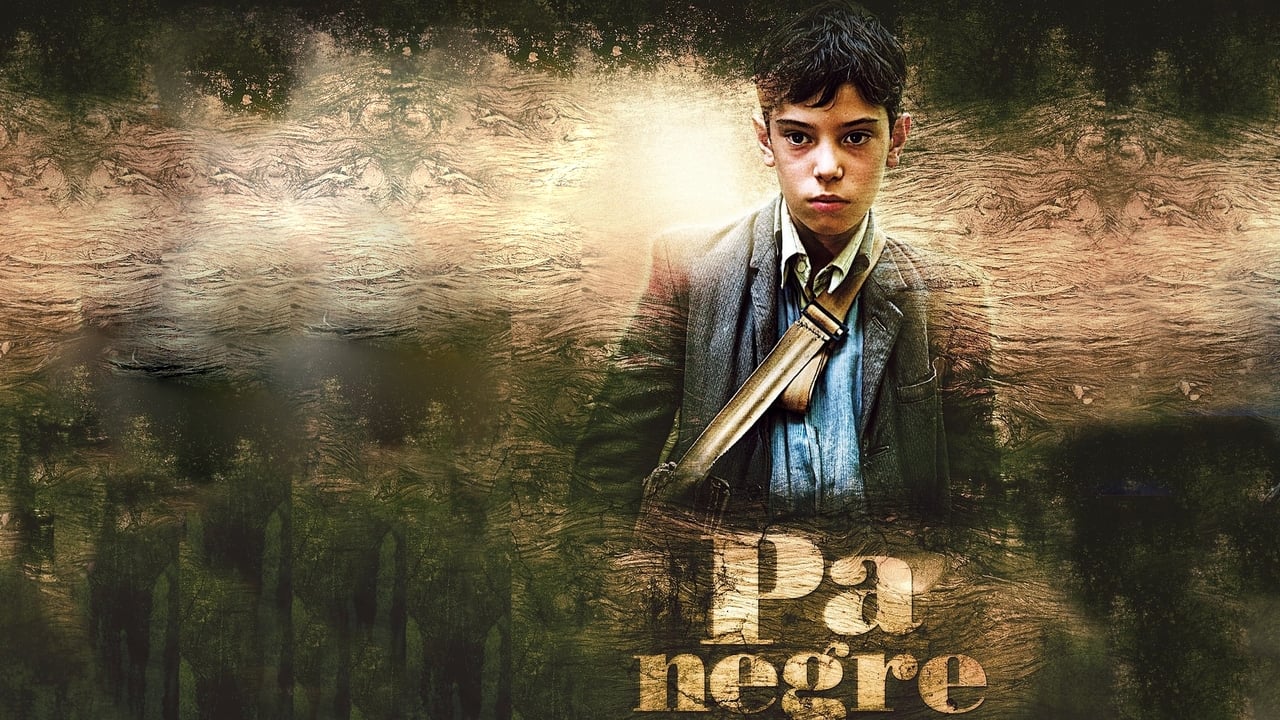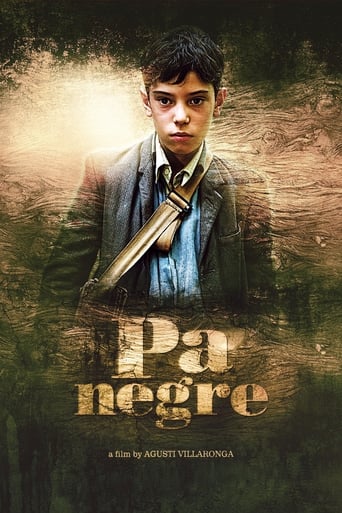

Pa negre could have been an interesting movie, but it feels a bit rough around the edges as a whole. It's sort of exaggerated in its evilness, the lies are so many that it would have been impossible for the characters to remember what they had just said and to keep any kind of contact with reality. This exaggeration probably comes as an inheritance from Pan's Labyrinth, but unlike its inspiration Pan Negre lacks subtlety and magic. As for the children, they are cruel and borderline psychopaths, except for the main character who is cold enough as to avoid going crazy. The scenes which portrays animal cruelty are indeed disgusting, I hope no animal was harmed in the making of the film.
... View MoreDark film with thrilling events , awesome performances , adequate settings and including a spotless as well as shading pictorial cinematography . The flick has some powerful , rousing images and occurs strong and downbeat happenings . This upsetting story of how war creates monsters is set in the harsh post-war years' Catalan countryside , as our hero is Andreu , a little boy (Francesc Colomer) who lives with his parents (Roger Casamajor , Nora Navas)and he then meets the corpses of a man and his son in the woods . The Mayor (Sergi Lopez) and Guardia Civil blame his daddy named Farriol (Roger Casamajor replaced Óscar Jaenada) of the deaths , but Andreu attempts to help him by finding out who actually murdered them . He investigates and finally discovers dark secrets . In this search he betrays his own roots and seeks the terrible truth . Then his father is detained , Andreu gives up hope of seeing him again and he goes home his grandmother , aunts and cousin . This is a thought-provoking flick dealing with astonishing events as well as a passionate retelling and a touching post-warlike drama with some historical insight . "Pa Negre¨ or ¨Pan Negro¨ being finely adapted by the same director Agustí Villaronga from a novel written by Emili Teixidor about a twisted tale of treason , lies , punishment and redemption . This moving as well as strong story is an emotive recounting and an intense drama , including disturbing intrigues , tragedies , deaths and executions . "Black Bread" results to be other of the uncountable stories to deal with dramatic deeds regarding the Civil War background . A familiar theme about the global horrors of a fratricide war , impossible to forget to Spanish Cinema , as the picture gives a deep detail about lives at a village set during post-Civil War and some atrocities being committed by Francoists . It belongs a sub-genre that revolves around the themes of the civil war through the eyes of a child , as there are a great number of pictures about this engaging issues such as ¨Secrets of heart¨ by Montxo Armendariz , ¨Butterfly's Tongue¨by Jose Luis Cuerda , ¨Viaje De Carol¨ by Imanol Uribe and Pan's labyrinth by Guillermo Del Toro . Agusti Villaronga also writes the script and being filmed in his usual formal and stylistic scholarship , without leaving a trace the thoughtful issues , in terms of dramatic and narrative excitement . The main problem has to face "Pan Negro" , beyond not being able to avoid falling into the politic pamphlet is precisely derived from the coldness of its staging , which eventually become monotonous over 108 minutes of footage . This is an enough budget Spanish production and obtained moderate success in the Spaniard box office . The starring boy is well performed by Francesc Colomer , he plays as Andreu who develops a moral consciousness against a world of adults fed by lies and ends up finding out the monster that lives within him . Excellent support cast forming an enjoyable human group of players and giving excellent interpretations such as Roger Casamajor as a Republican father with deep idealism to be made responsible for two strange deaths , Laia Marull as unsettling Pauleta , Eduard Fernández as abusive teacher and Sergi López who plays a similar role to Pan's labyrinth as a cruel fascist . This was first Catalan-language film to win the Goya Award for Best Film and Spain's official submission to the Best Foreign Language Film category of the 84th Academy Awards 2012 .Appropriate and evocative musical score by Jose Manuel Pagan . Dark as well atmospheric cinematography by Antonio Riestra who is nowadays working in internationals productions as ¨Mama¨ , ¨Lidice¨ , ¨Czech-Made Man¨ and ¨Last knights¨. Being filmed on location in Olot , Gerona , Puig-Reig, Santa Fe Montseny, Talamanca, Tavertet, Vic , Puig De Balma , L'Espunyola , Manlleu, Mataró , Barcelona , Catalonia, Spain . The motion picture was compellingly directed by Agusti Villaronga . Agusti was born in 1953 in Majorca, Balearic Islands, he uses to make films including genuine chills , suspense , mystery and dark atmospheres . His movies pack excellent creation of taut , thriller , emotions and rare atmospheres such as ¨Aro Tolbukhin¨ , ¨El mar¨ , ¨El Niño de la Luna¨ and especially ¨In a glass cage¨ or ¨Tras el Cristal¨ . His greatest success was this ¨Black bread¨ or Pa Negre¨ winning several Goyas .
... View MoreBlack Bread is an elaborate Catalan Spanish ghost story which begins with a hooded man driving a horse drawn carriage through the woods where he attacks Dionis and his son Culet and kills them by leading the horse off a cliff blind folded. A witness, Andreu, an 11 year old boy goes back to town to report the incident. Farriol, who is the partner of Dionis and also Andreu's father is the lead suspect in the murder, due to his previous opposition to Franco during the war. The mayor was in love with Farriol's wife, Florencia, which creates bad blood until Farriol is forced to leave Spain for France. Andreu's grandmother works for the richest family in the area. Now things become really complicated. Andreu becomes friends with a tb patient from a monastery who runs around believing that he has wings. Florencia convinces the wealthy woman to take in her son Andreu as a sort of step child in order to have a better life with education at a private school. More mysteries unfold concerning an old murder and Black Bread proves to be an interesting drama.
... View MoreI saw this film at Noordelijk Filmfestival 2011 (in Leeuwarden, province of Friesland NL). We know very little details from the Spanish civil war, and the period after that under Franco. Our history lessons did not cover it at all. But we could deduce a broad overview from the ingredients that were offered to us throughout the developments in this film. History lessons were passed to us along the line, piece by piece.A lot of characters are introduced in the story, none of them redundant, even the minor roles have their place and cannot be left out. Their evenly dosed appearances were always understandable, never letting us feel overwhelmed. I was very happy this to be different from some costume dramas, where the viewer looses control and cannot remember how all these persons relate to each other and how they fit in the plot. No problems like that in this case.Our sympathies with the main characters had to move from time to time, given new facts coming to light, or new suspicions that were seeded by not-so-innocent bystanders. Choices that seemed apparent at first, changed perspective from time to time. I eagerly followed those new directions, and could not escape from the story line (even if I wanted to). It definitely proves that I got involved in the motives of the characters. Well done, obviously having an ingeniously constructed script to work from.All in all, I found the 108 minutes spent very well. The story has much drive, and its outcome cannot be predicted, maintaining the whodunit tension throughout. Also, the film shows several characters to have a better side, in spite of making a negative impression at first, for instance the school teacher. Reasons enough that the film can be attractive for a broad audience. However, I fear that the "official" announcement text won't work on the casual reader.
... View More